What Ιs a “Koutouki”?
A Thessaloniki expert selects 13 spots...
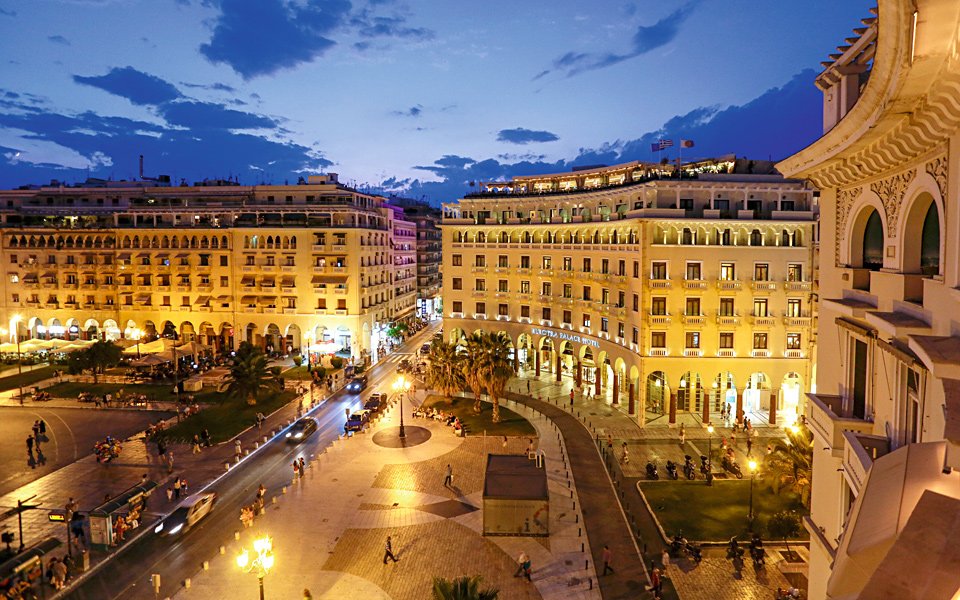
Designed in 1918 by Ernest Hébrard, exemplifies the French architect’s unrealized vision for the entire city.
© GettyImages / IdealImage
The precise location of Thessaloniki city center is open to debate. Most visitors will tell you it is bustling Aristotelous Square, which opens onto the sea front, where one can see the White Tower on the left and the old port on the right. However, when locals refer to “the center” they normally mean the “historical center” of Thessaloniki which, surprisingly, does not include the waterfront, which they view as a distinct area referred to locally as the paralia (“seashore”).
The city’s inner center is steeped in history. The range of architectural styles reflects its Greek, Roman, Byzantine and Ottoman past. Over the centuries, the wider region has been occupied by a number of diverse cultures, each of which has left its own distinctive mark. Visitors can easily explore the beating heart of the city, stretching from Venizelou Street in the west to the iconic White Tower in the east.
With Eleftherias Square right next to the port as your starting point, your exploration gets off to an emotion-charged beginning. The square has a tragic past, for it is the place where the city’s Jewish population, roughly one-third of its inhabitants, was rounded up in 1942, before being deported to Nazi concentration camps. A memorial at the southeast end of the square commemorates their terrible fate. Before you leave the square, take a moment to look at the iconic Stein building on the corner of Venizelou and Kalapothaki streets. This could provide one of your best Instagram moments, along with several other neoclassical buildings in the same district.
“The city’s inner center is steeped in history. The range of architectural styles reflects its Greek, Roman, Byzantine and Ottoman past.”
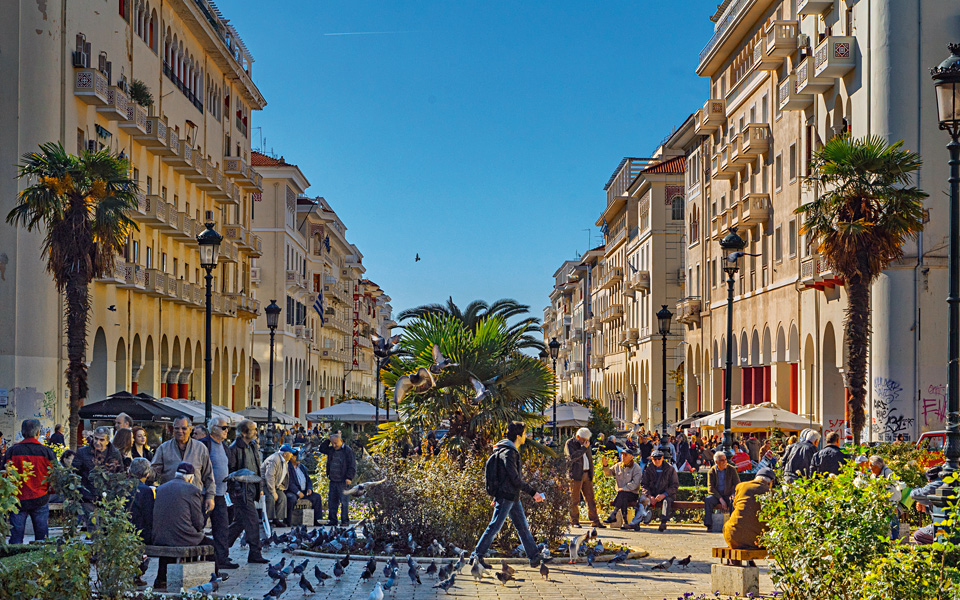
Aristotelous Street, above Tsimiski, buzzing with activity. Even the pigeons like hanging out here.
© Perikles Merakos
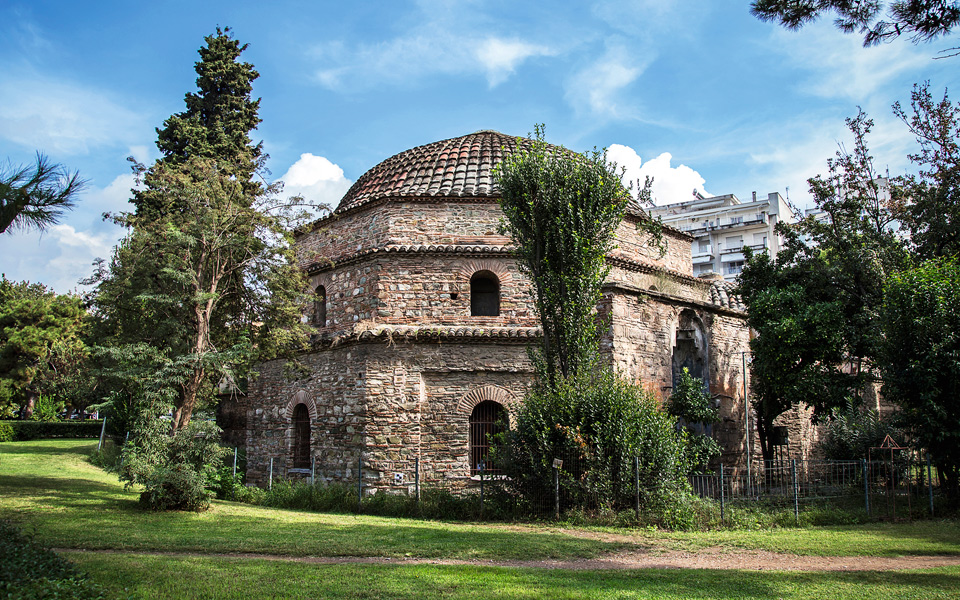
Bey Hamam or “Baths of Paradise”, the city’s first Ottoman bathhouse
© Alexandros Ioannidis
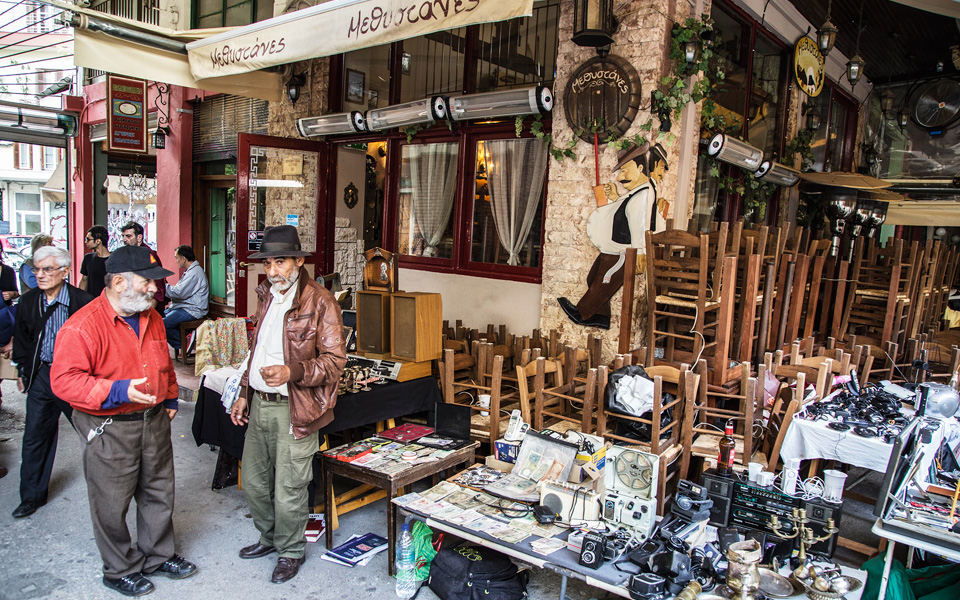
Bit Bazaar is a great place for offbeat shopping and traditional low-brow food.
© Alexandros Ioannidis
If you’re visiting Thessaloniki in late autumn and have an eye for architecture, then your trip may coincide with Open House Thessaloniki which gives architecture aficionados the opportunity to be guided through the city’s most remarkable monuments and contemporary structures. If not, play “Open House” on your own by trying to get a peek inside the Ermion in the Karypi Arcade (corner of Venizelou & Ermou). Erected in 1925, this remarkable art deco building was Thessaloniki’s very first shopping mall.
As you make your way up Venizelou Street, wander through the alleys and discover the antique shops of the colorful Bit Bazaar. Named after the Turkish word “bit” (meaning old, worthless) this market has been operating since 1928. Many of the antique stores have now been converted into coffee houses and tavernas, making the area worth a visit day and night.
Nearby, the late 1st century AD Ancient Agora (Roman Forum) has been wonderfully preserved and is still impressive today. Art installations and large-scale art pieces are often displayed on the site, along with a permanent exhibition depicting Thessaloniki’s history. The agora also marks the beginning of Aristotelous Square. Designed by celebrated French architect Ernest Hébrard, the square was built in 1918, incorporating elements from both Byzantine and Western architecture. Dedicated to the great philosopher Aristotle and affording a view of majestic Mount Olympus standing far in the distance, this is probably the busiest part of the city. Shops, boutiques, cafés, restaurants and hotels line the square and its nearby streets. Look for the architecturally impressive Olympion – the cinema that hosts the majority of Thessaloniki’s International Film Festival screenings, or visit the stone-built Bey Hamam, the city’s first Ottoman bathhouse, constructed in 1444 by Sultan Murad II and alternatively known as the “Baths of Paradise.”
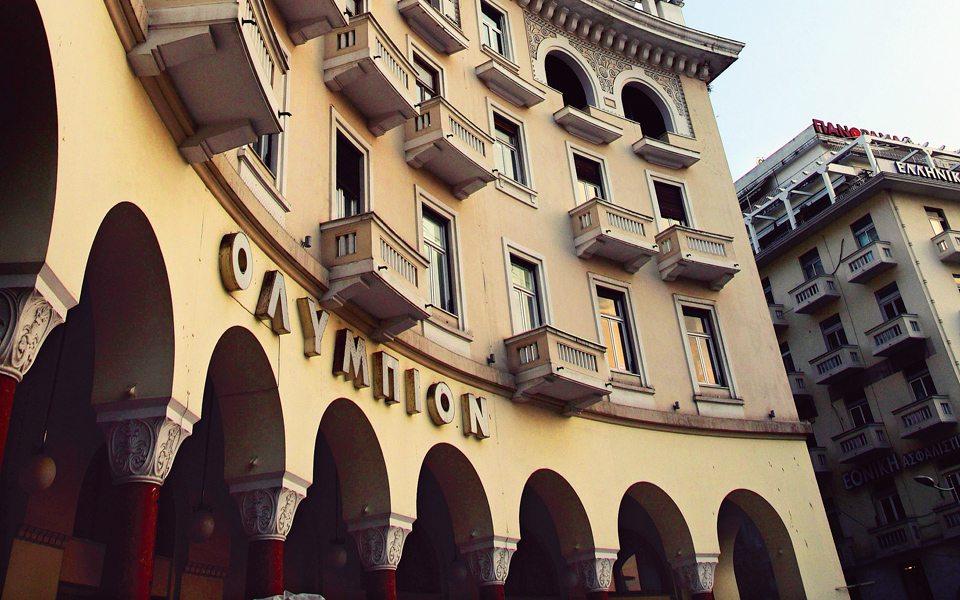
The iconic Olympion cinema, designed in 1950 by French architect Jacques Mosset, is a film buff favorite.
© Sakis Gioumpasis
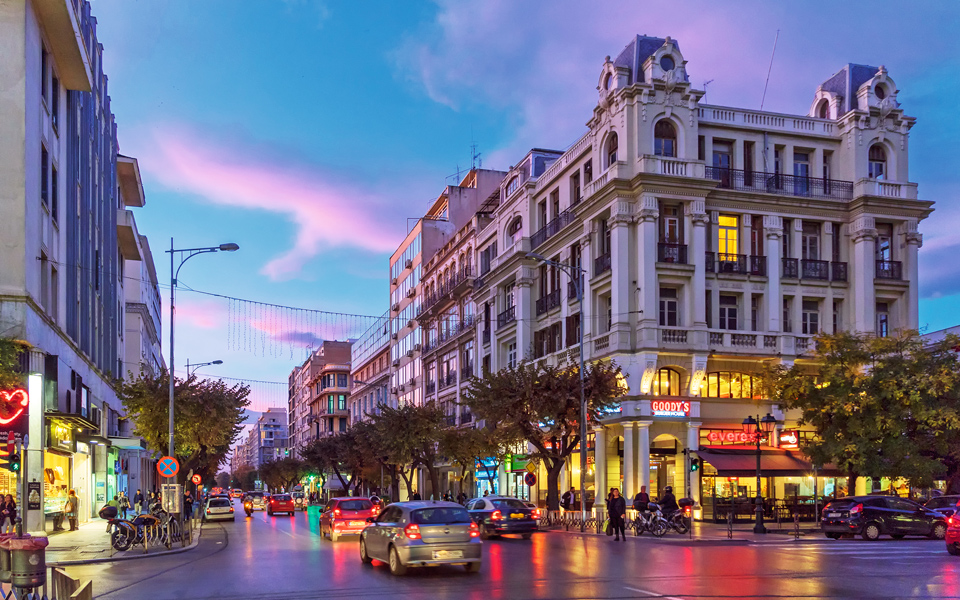
The Gattegno-Florentin Mansion on Tsimiski & Venizelou is one of the few eclectic edifices from the 1920s to survive urban homogeneity.
© Perikles Merakos
If shopping is on your agenda, bear in mind that the city’s female population has a reputation for being fashion conscious and trendy. Take a stroll down Tsimiski Street, the city’s quintessential High Street. Head up Mitropoleos Street and smaller Proxenou Koromila, both packed with high-end boutiques, designer stores and art galleries. If you prefer some alternative shopping or traditional handcrafted objects, explore the cobblestone alleys around Athonos Square. There you will also find tavernas and delis, herbs, groceries and practitioners of time-honored occupations such as basket-weaving. Choose some traditional products for friends back home or try several delicacies on the spot, preferably with a shot of ouzo.
As you continue in an easterly direction, you will come to the magnificent Church of Aghia Sophia (Holy Wisdom), which has stood there since the late 7th century and, like most Early Christian monuments in the area, had been converted by the Ottomans into a mosque. But the most intriguing story of a monument successively serving as a place of worship for different religions is that of the Rotunda. Built in the early 4th century by Roman Emperor Galerius, possibly as a temple dedicated to Zeus or as his mausoleum, it then became a Christian church, possibly under the patronage of Emperor Theodosius I. In 1590, during Ottoman rule, it was converted into a mosque and reconsecrated as a church in 1912 when the city was liberated during the First Balkan War. Impressive mosaics decorate the interior while a minaret still stands outside, just a short walk from the Arch of Galerius, commonly referred to as “Kamara” – the city’s most favored meeting point.
Heading south, you will cross Navarinou Square where the ruins of Galerius’ summer residence provide a fascinating backdrop for a hangout popular with the city’s young crowd and Aristotle University students with some time to kill between lectures at the nearby campus.
To wrap up your tour, keep walking towards the waterfront, to the iconic White Tower.
A Thessaloniki expert selects 13 spots...
A living portrait of Olympou Street,...
The Thessaloniki-born winemaker welcomes us to...
This short walk takes in eleven...